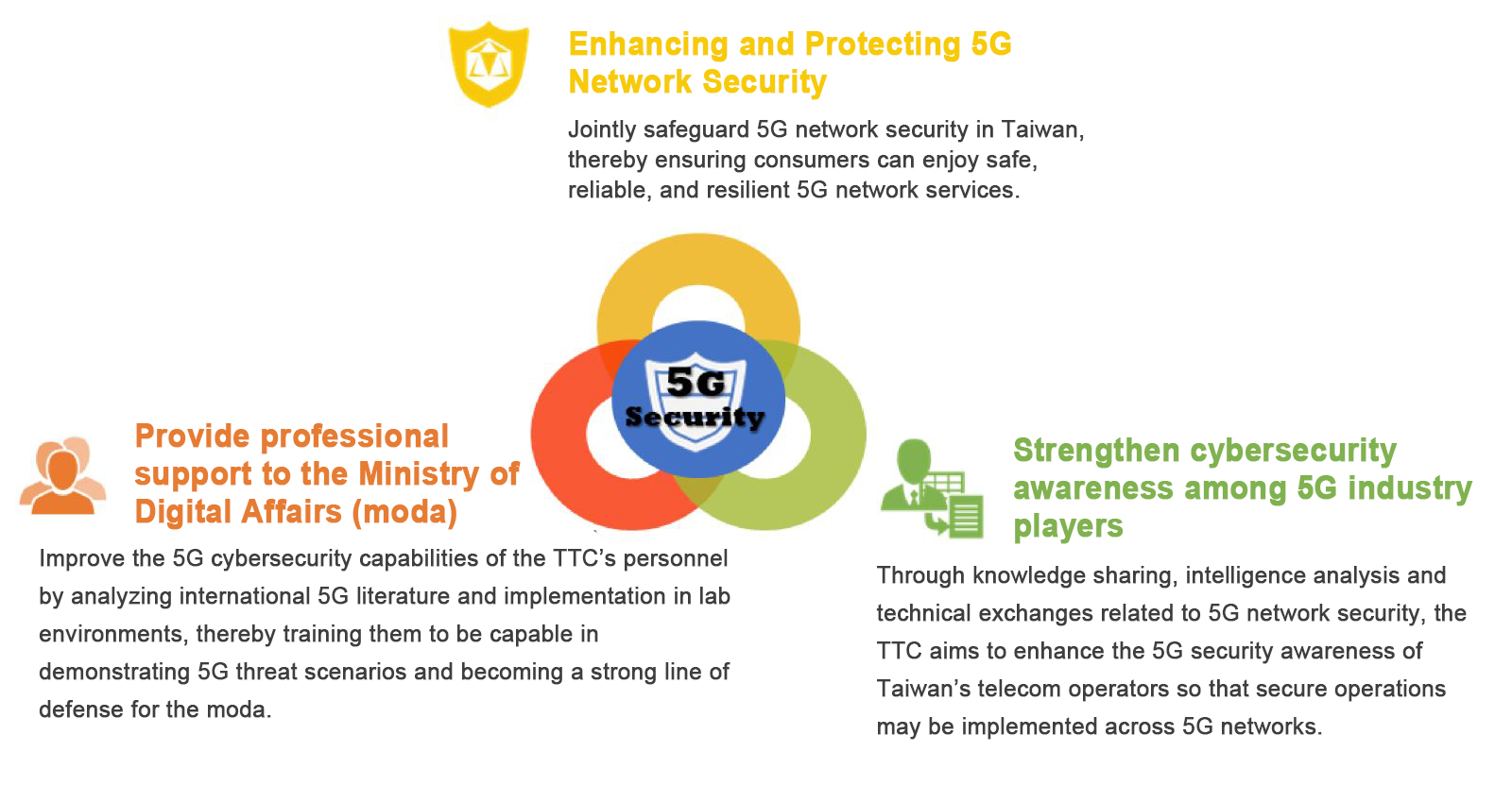- 首頁專業服務ICT Tech Think TankICT Cyber Security Think Tank
- 回上頁 列印
ICT Cyber Security Think Tank
Research and develop technical specifications, guidelines, and industry standards for information security in Critical Telecommunications Infrastructure and Customer Premise Equipment.
The network facilities provided by communications operators (including mobile communications, fixed communications and communications networks) are an important and critical backbone for the domestic development of digital convergence and the Internet of Things. This encompasses the integration of various digital services from telecommunications, broadcasting, media, and information technology to closely connect with general consumers who use digital applications that rely on these communication networks. However, today's cybersecurity threats are increasing in magnitude and depth. Threats ranging from targeted cyber attacks, cyber espionage, and radical hackers are becoming increasingly complex. Malicious cyber activities have a profound impact on our everyday society in the digital economy and can generate massive threats and impacts. In order to respond to the cybersecurity issues arising from these emerging trends, the TTC considers factors such as harmonization and consistency with international standards to successively assist competent authorities and ministries in formulating technical specifications, guidelines, and industry standards for Internet of Things, satellite and communication equipment. This acts as a benchmark for cybersecurity testing and provides a security design basis for manufacturer’s products.
| Item | Technical Specifications |
|---|---|
| 1 | Technical Specifications for Security Testing of Information and Communication Equipment for Critical: Routers, switches, firewalls. |
| Item | Technical Specifications |
|---|---|
| 1 | Infocom Security Technical Inspection Guidelines of Wireless Local Area Network Access Point and Router |
| 2 | Infocom Security Technical Inspection Guidelines for Set-Top Box Internet Connection Function of Fixed Communications Multimedia Content Transporting Platform and Cable TV |
| 3 | Infocom Security Technical Inspection Guidelines of Wi-Fi IP Camera |
| 4 | Cybersecurity Test Guideline for the next generation Node B (gNodeB) |
| Item | Technical Specifications |
|---|---|
| 1 | Infocom Security Test Specification of embedded software on smartphone systems |
| 2 | Cybersecurity Standards and Testing Specifications for Smart Speakers |
| 3 | Cybersecurity Standards and Test Specification for consumer IoT products |
| 4 | Cybersecurity Standards and Test Specifications for Wireless Broadband Routers |
| 5 | Cybersecurity Testing Specifications for Set-top Boxes |
| 6 | Cybersecurity Testing Specifications for Modems |
| 7 | Cybersecurity Guidelines for Domain Name System Information |
| 8 | Cybersecurity test specification for user terminals of Low Earth Oribit (LEO) satellite |
Development of a cybersecurity research and testing environment for 5G networks.
5G networks are critical infrastructure for nations and act as a key foundation for realizing a digital nation, digital economy, driving industry transformations, and moving towards a smart society. In order to cope with diverse applications, 5G adopts a service-oriented open architecture. It can quickly expand network functions with flexibility but the resulting cybersecurity threats are also greater than before. The TTC takes into account the evolution of 5G technology and the construction schedule of telecom operators while continuing to assist the competent authorities and ministries in implementing rolling adjustments and improving the relevant laws and regulations that clearly define the cybersecurity obligations of 5G telecom operators. By building a 5G network security laboratory, the TTC will verify the feasibility of regulations and assist telecom operators to complete security protections for 5G networks.
In order to ensure that Taiwan's 5G networks are safe, reliable and resilient, the TTC continues to assist competent authorities and ministries to formulate the reference framework, review benchmarks, audit plans, and standard operating procedures of cybersecurity maintenance plans for fifth generation mobile communication systems to confirm the appropriateness, feasibility and implementation of telecommunications operators' cybersecurity maintenance plans. At the same time, the 5G network security threats of international organizations and major countries is analyzed and implemented in the laboratory to propose solutions or mitigation measures. This helps telecom operators improve 5G network security, protects the rights and interests of consumers, and promotes relevant vertical application fields as well as development of innovative application services.

Building a cybersecurity IV&V (Independent Verification and Validation) environment for the satellite industry chain and implementing cybersecurity protection for satellite networks.
As global communication technologies rapidly advance, satellite communications have become a critical area of technological competition for the future. Low Earth Orbit (LEO) communication satellites are particularly important in providing communication services, especially during disaster response in our country, where they can offer crucial communication support. To enhance the security from ground to space, it is essential to improve the cybersecurity verification process to strengthen LEO satellite networks. Ensuring the cybersecurity of our nation's satellite systems and continuously building a robust cybersecurity IV&V (Independent Verification and Validation) environment for the satellite industry chain has become a key task at present.